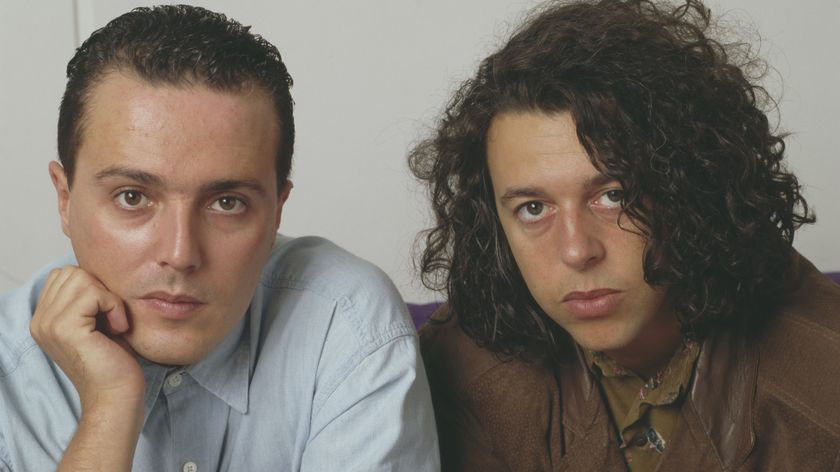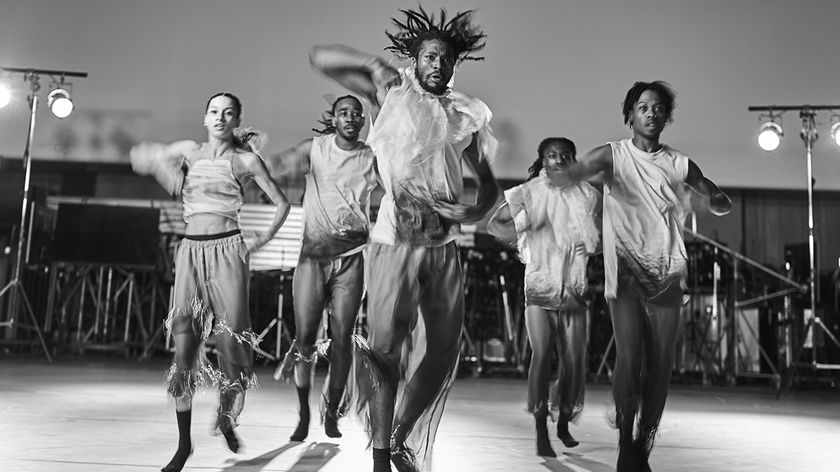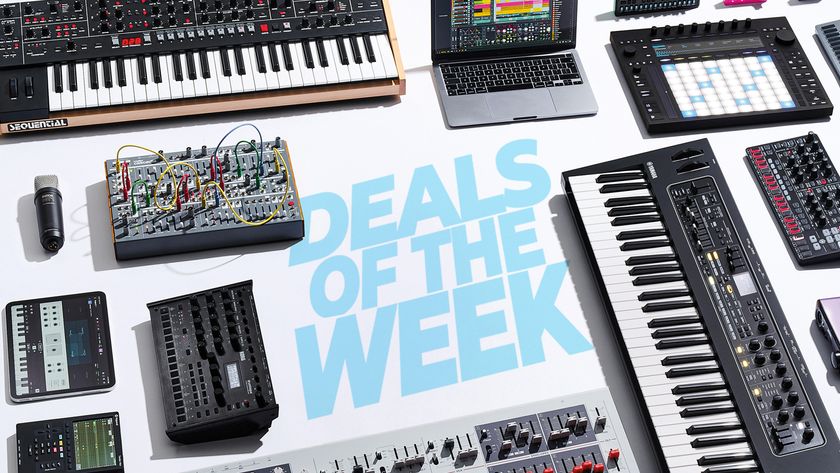"I have no interest in copying what I've already done, copying is no fun": Dave Smith on relaunching the Prophet-5, choosing his favourite synth and why he misses techno
The constraints and challenges of developing new hardware in the midst of a pandemic
MTS 2020: It would seem that a thirst for creating something new and doing what you love cannot be tamed by a little thing such as a pandemic. Not even reaching the tender age of 70 has put the dampeners on Dave Smith's ardour for building some of the most iconic synthesizers ever.
We were lucky enough to catch up Dave for a chat about relaunching the Prophet-5 after so many years of being asked to do so, by all and sundry. Did we all, collectively, harass him into it?
We also attempt to force him into choosing his favourite child, something that he's often loathed to do, but we think we got a definitive answer out of him this time. And by 'child', we do mean synth.
Then there's the small matter of missing Detroit's Movement festival, often a pilgrimage to techno's heartland, but also the lack of live music in general. Something, it would seem that has affected Smith the most in these testing times.
When did you first decide that you wanted to remake the Prophet-5?
"Well, it must have been a little over a year ago. You know, everybody's been asking for it forever. And I've ignored it forever, and always said, 'Oh, I'm not gonna do that. Why would I do that again?' And you know, it just the idea came up again last year and started thinking about for some reason, started thinking about it a little bit more seriously.
"Once I realised that we could do a couple really cool things like the dual filter thing, then all of a sudden became a fun project, you know, as opposed to, you know, I have no interest in copying what I've already done, you know, copying is no fun. So, but data became a new instrument, using the same old parts, but designing it in a you know, with latest technology surrounding them.
Get the MusicRadar Newsletter
Want all the hottest music and gear news, reviews, deals, features and more, direct to your inbox? Sign up here.
"And so it became an awesome project to work on. I got to relearn everything about the original, what we did right and what we did wrong. And how can we make it sound exactly the same, but go well beyond that? All of a sudden, it just sort of happened."
You've mentioned that you want to recreate the vibe of the original. What sort of things went into creating the Vintage knob and how did you manage to condense all that 'vibe' into one dial?
So this is all the real thing, you know, we're not going to try to cut corners.
"Well, the first rule was, it had to look exactly like a Prophet-5. I mean, no other instrument has ever looked like a Prophet-5, so it had to look like that. We didn't want to add effects, we didn't want to start adding a bunch of stuff, because again, we wanted it to be pure, a pure Prophet-5.
"There is, and everybody knows this, something about that sound, even with the simplicity of the front panel, it's not overloaded with features, you know, there's only one LFO. That's all these things that we've gotten used to, and yet, it just sounds so good.
"With the dual filter thing, as soon as we realised we could do that and do it with the right, genuine parts. We were big on that. We used the original 3340 and 3320s from Curtis's company, OnChip Systems and the 2140 is a redo of the 2040 from the Rev1 and the Rev2. Dave Rossum designed the original 2040 and he designed the updated 2140. So this is all the real thing, you know, we're not going to try to cut corners.
"There's an empty spot on the panel on the original Prophet-5. And, so it was like, right, here was a hole on the interface, let's put something there. We had the idea of something called the Vintage knob and originally it was just a placeholder.
"We knew that somehow we get from super tight to super loose, but we didn't know what that meant until we got far enough into the development that we could actually hear it and play it and everything was working.
"Through a lot of analysis of the older products, we decided what it should do and with a lot of tweaking, it just came out perfectly as opposed to just going from good to stupid. It goes from tight to loose, but very musically, and I think that's the key.
"I mean, set it around two on a lot of pads and it's just magic, you know, or if you have the old Tom Sawyer sound, that sort of thing on the envelope to spread all over the place, it just sounds massive.
"But if you want a modern sound, which you will on a lot of sounds and you just leave it at four, you know, basically off and everything's tight and it kind of works the way you would expect. Using the right parts was the key to the sound.
We were blown away with what a Prophet-5 sounds like with velocity, it's a simple thing, conceptually.
"There are a couple of other things that made a huge difference. Obviously, these days, all the keypads you buy have velocity and aftertouch. So that's what we wanted to use in here because the original Prophet-5 had neither.
"The original had two cassette switches in the upper right corner and of course, we don't need cassette switches anymore. That's how you used to save programmes, dump them in an audio format to a cassette and then load them back in. One of them we made an aftertouch button, so you could either go to the LFO, or the filter, or both. And the other switch is a velocity button that goes to either the filter or the amplifier or both.
"We were blown away with what a Prophet-5 sounds like with velocity, it's a simple thing, conceptually. The Prophet is really good at doing e-piano or clavinet types of sounds and they sounded really good on the original, but you add velocity to that and it's a whole new ballgame. So that was kind of an extra plus that we thought, 'Oh, we have to do this.' and then 'oh, we did it. Wow!'"
How many people in your in your team were dedicated to the development?
"Well, we have a very small development team. So it started with my main hardware guy, Tony Caravitas, who did the initial design, and I was working on that a lot. Then I ended up doing a whole lot of the tweaking because I was the only one who had a Rev3 next to me. The tweaking started just when COVID started, so everybody was stuck at home. I was, happily, stuck at home with the new Rev4 and a Rev3 next to it, trying to get them to act and feel the same way.
"So there were only two of us really dealing with the hardware side. In fact, I think I laid out the front panel designs and laid out the circuit boards, just because I haven't done that in a while.
"Then mostly two of us did the software side, too. So I guess there was only three, maybe four of us involved with the design. That's separate from the mechanical design, which was not insignificant on this one. Because it had to look exactly the same, but we weren't going to build it the same way because the old ones broke all the time.
"We've completely redesigned it, so it's much easier to work with. It's much more roadable, physically, but it still looks the same. And you know, that took a lot of work. It's a very expensive box to build, because we use really top-quality wood and then a lot of extra metal in there compared to the original."
What challenges have sort of been thrown up by the pandemic?
"Oh, it was, it was a challenge. For some parts of it, it didn't matter. There was a period was just me working on matching stuff. But yeah, we've all been working from home for six, seven, eight months now.
"It is hard to design a hardware product with you when everybody's working at home. So there were some challenges, 'oh, well, we can't get this year' and 'how do we get this part here' and 'somebody's gonna have to come pick this up.'
"We have had one person in the office typically every day, just as somebody who's there and occasionally two or three of us would go in and be careful if we're building something up.
The Prophet TA is awesome, but from this round, the Prophet-12 is still one of my favourites.
"But yeah, it's so much easier if you just have an office and everybody's there. And you can just see all over the site, 'hey, this doesn't work. Can you fix it?' or 'can you take a look at this?' Or 'how does this sound?' So the isolation, you know, probably slowed the product down quite a bit
"You know, when you're testing a beta unit, the filter is really good, but needs this little tweak, but we have to change a resistor value and you have to change it on every voice so somebody has to go in with a soldering iron and change those parts.
"So what we fairly early on, we actually set up a lot of our people with home electronics systems, where they went out and bought all the equipment and parts they needed so they could do those sorts of things at home. It's a lot of adjustment, and it did make it slower, but ultimately it came out well.
We've noticed on Instagram that you are the proud recipient of the serial number one of the Prophet-5. Is that something you get to do every time a new product comes out?
"Yeah, but actually I took a Prophet-10 and back there is a serial number one Pro-3 SE, but I didn't take a regular one because the SE!
"I probably won't take a module because I already don't have enough room for all products, so I'm going to get selective.
"Right now I have the P-10, the Prophet X and the SE is kind of the main cool synths to have quickly accessible. The other ones back there are all MIDI'd up, so I can play them easily but I'm starting to lose interest in some of them."
Prophet-5 now shipping! I think we know who serial no.1 goes to... #Sequential #Prophet5 Sequential
A photo posted by @sequential_llc on Oct 5, 2020 at 2:01pm PDT
It's like asking a parent their favourite child we know, but what is the synth that you've thought 'That was so good, I'm so proud of that one'?
"The Prophet VS is kind of cool, but in some ways, it's a one-trick pony sound palette wise. The Prophet TA is awesome, but from this round, the Prophet-12 is still one of my favourites. It's just there's something magical about it. It's different than anything else.
"And the Evolver. I mean, I almost wish the Poly Evolver keyboard was done a little differently a little better. But I was still learning how to design stuff back then."
What would you change about the Evolver?
"Just how it was put together. That's a little unfair, somewhat because I'm thinking about technology that we have now that I'd maybe didn't have 15 years ago
"The first five years at the company [Dave Smith Instruments], I was the only person in the company. So I was doing everything when the Evolver rack and keyboard products came out, you obviously learn a whole lot.
"I think if you look at our progression of products, you know, each one is a big improvement in a lot of ways over the others, but the Prophet-12 you know, I tend to still like polys more."
Despite record sales in the music instrument industry since COVID which is great for the company of course, is there anything else about the pandemic that's really affected you guys?
It's all three days of techno music and we have a whole lot of DJ friends and we just go and it's an absolute blast.
"I miss [live music] the most. It's driving me crazy because we love live music and of course we haven't had any, so I'm hoping a year from now it's gonna be wide open again.
"We like to get out of town you know. Artists will contact us when they're playing here, they might come to the office, or we might go to the show.
"There's a couple of shows and things we do like to travel to. One of our favourites is the Movement Festival in Detroit. It's all three days of techno music and we have a whole lot of DJ friends and we just go and it's an absolute blast. It's just so much fun and we couldn't go this year and it's so sad but anyway, soon we hope."

I take care of the reviews on MusicRadar and Future Music magazine, though can sometimes be spotted in front of a camera talking little sense in the presence of real musicians. For the past 30 years, I have been unable to decide on which instrument to master, so haven't bothered. Currently, a lover of all things high-gain in the guitar stakes and never one to resist churning out sub-standard funky breaks, the likes of which you'll never hear.

“It was originally called Everybody Wants To Go To War, which I knew didn’t work. When you’re a songwriter who doesn’t like the lyric, the song dies”: How Tears For Fears created an ’80s mega-hit

“Some of the biggest artists who are performing have not been announced": Tom Morello teases "surprises" at Black Sabbath's farewell gig, and advises fans to "get there early"








